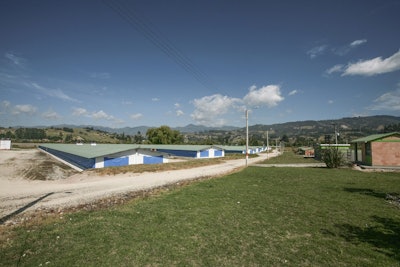
Colombia was recognized as Newcastle disease free by the World Organization for Animal Health (OIE) in July 2021, after the country declared itself disease-free in April of that year.
Eradication took seven years to achieve. The last disease outbreak occurred in September 2019 and 22 months of subsequent monitoring showed that viral activity and disease circulation had stopped in the country.
Following consultation with stakeholders, Colombia submitted all necessary documentation to the OIE earlier this year and was recognized as free from Newcastle disease in July.
Key focus
Achieving Newcastle disease status was not an easy process and started with the country’s industry association, the Colombian Federation of Poultry Producers (Fenavi), deciding to make its eradication a priority.
“It was a decision made by the poultry producers themselves,” explains Gonzalo Moreno, Fenavi CEO, and, in practical terms, the process began with the development of a regulatory framework to make farms biosecure and to establish a farm registry.
Adopting biosecurity
Making farms biosecure, however, was a huge challenge, in part due to the ongoing presence of backyard flocks in Colombia. Tremendous effort was expended to educate farmers on the value of biosecurity. Some smaller farms are still not biosecure, potentially putting the country’s disease-free status, however, work continues.
For Moreno, one of the biggest difficulties was to convince producers that reporting an outbreak would not cause them problems, and that an outbreak on one farm could affect the farms of others. With testing results now available within 24 hours, compared to seven days previously, early reporting contributed to stopping the disease spreading.
The technology available on Colombian farms has become world class, and poultry producers have become biosecurity experts.
“Biosecurity, for us, is a management tool, a business tool”, comments Moreno. Instead of waiting for an outbreak to emerge, the industry has been actively seeking out the disease.

Gonazalo Moreno, CEO of Colombia’s industry association Fenavi, notes that the decision to eradicate Newcastle disease came from producers themselves, and that the industry has become biosecurity experts. (Courtesy Fenavi)
Technical training
Training for Fenavi’s technical staff was paramount and strengthening the team was also supported by the association’s members. Despite being small in number, almost 50% of Fenavi’s resources were allocated to the technical team through the producer levy program the National Poultry Fund. With this funding came a strong desire to actually get things done.
Learning curve
Colombia’s 2018 Newcastle disease outbreak, for example, taught the industry numerous lessons. The costs of administering vaccines were high, and the sector lacked a sufficiently large vaccination crew.
To resolve this, Fenavi entered into an agreement with the country’s veterinary schools, resulting in students vaccinating all backyard flocks. Students were sent to backyard flocks rather that to commercial farms as the latter had already put biosecurity protocols in place and were able to vaccinate flocks themselves when necessary.
Working with students was key to the campaign and not only did the agreement supply much needed labor but gave students valuable exposure to the poultry industry.
The 2018 outbreak was identified as originating in fighting cocks and, initially, owners were reluctant to have their birds vaccinated, fearing that vaccination would reduce their strength. Fenavi worked with fighting cock associations to overturn these misconceptions, educating owners that unvaccinated birds represented an ongoing disease risk.
Key to achieving recognition as Newcastle disease-free was working with the Colombian Agricultural Institute (ICA), a government body attached to the Ministry of Agriculture and responsible for official communications with the OIE.
The timing, perhaps, could not have been better. ICA had traditionally maintained a focus on cattle, however, in 2018, Dr. Deyanira Barrero was appointed ICA director. With a deep understanding of the poultry industry she, along with Jorge Sosa, ICA poultry leader, are viewed by Fenavi as central to Colombia declaring itself Newcastle disease-free the subsequent OIE recognition.
11-step approach
In its efforts to eradicate Newcastle disease, in particular, Fenavi points to eleven steps that were followed. They were:
- Strengthening the ICA-Fenavi relationship;
- Elaboration of procedures and instruction manuals;
- Increasing diagnostic laboratory capacity to ensure faster response times;
- Applying new biosecurity measures to prevent Newcastle disease from entering the country; ??
- Risk analysis;
- Epidemiological surveillance;
- Traceability;
- Emergency systems and vaccination;
- Foci control and eradication;
- Risk communication; and
- Training.
The dream of exports
The successful public private partnership that emerged to eradicate Newcastle disease bodes well for the future of the Colombian poultry industry.
In addition to seeking disease free status from the OIE, the country is working through a sanitary equivalence agreement with the U.S.
“Our dream is to be able to export poultry products,” say Moreno, continuing: “We cannot control the price of commodities - that is 75% of the cost on average-, however we can control biosecurity on our farms and, as a consequence, improve our sanitary status.”
The industry is conscious, however, that it will not be able to compete directly with the U.S., or Brazil, given that both countries have access to their own sources of raw materials and feed. Colombia’s opportunity would be in niche markets.
The country’s location, positioned halfway between the north and south of the American continent and the Atlantic and Pacific coasts, along with the numerous free trade agreements that the country has signed, should also be pluses. This combination has already brought Colombia to the forefront in numerous markets, including coffee and flowers.


















